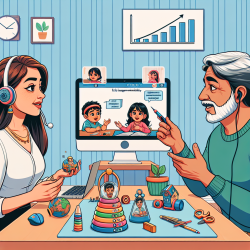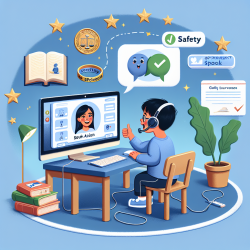As professionals in the realm of special education and online therapy, our mission is to provide the most effective interventions to support language development in children. A pivotal area of focus is the role of parents in early language remediation, particularly through the lens of pragmatics—the social use of language. Drawing from the insights of H. Ayala Manolson's research, "Parent Training: A Means of Implementing Pragmatics in Early Language Remediation," we explore how therapists can enrich their practice by incorporating parent training into their online therapy sessions.
Historically, the role of speech and language pathologists has evolved significantly, moving from a hands-off approach in early childhood to actively involving parents as partners in intervention. Manolson's research underscores the importance of early intervention and parent participation, highlighting a model where parents are trained to facilitate language in their everyday interactions with their child. This approach not only leverages the natural learning opportunities within the home environment but also addresses the pragmatic aspects of language learning.
For online therapists, integrating parent training into your practice means adapting Manolson's insights into a virtual format. Here are strategies to consider:
- Virtual Workshops: Conduct online workshops for parents, focusing on verbal and nonverbal techniques that facilitate language development. These can include modeling, expanding, and imitating speech, as well as understanding and responding to the child's nonverbal cues.
- Individualized Online Sessions: Offer personalized sessions where you observe and guide parent-child interactions in real-time, providing immediate feedback and strategies tailored to the child's specific needs.
- Resource Sharing: Utilize online platforms to share videos, articles, and guides that reinforce the training parents receive, enabling them to revisit the material as needed.
- Community Building: Create online support groups where parents can share experiences, challenges, and successes. This fosters a sense of community and mutual support that extends beyond individual therapy sessions.
- Monitoring Progress: Implement digital tools for parents to record and share videos of their interactions with their child. This allows for ongoing assessment and feedback from the therapist.
Manolson's research highlights the transformative potential of parent involvement in language remediation. By equipping parents with the skills to support their child's language development, therapists can extend the impact of their interventions beyond the confines of traditional therapy sessions. This is particularly relevant in the context of online therapy, where direct interaction with the child is limited.
Embracing parent training as a component of online therapy not only aligns with current research but also responds to the need for accessible, effective interventions in the digital age. It is a testament to the evolving role of therapists, who act not just as direct service providers but as facilitators and consultants, empowering parents to be active participants in their child's language development journey.
Incorporating parent training into online therapy practices offers a promising avenue for enhancing the efficacy of early language remediation. It is a strategy that respects the complexity of language learning, acknowledges the unique role of parents, and harnesses the power of technology to bridge gaps in traditional service delivery.
To read the original research paper, please follow this link: Parent Training: A Means of Implementing Pragmatics in Early Language Remediation.










